- Home
- S J MacDonald
Karadon (Fourth Fleet Irregulars) Page 15
Karadon (Fourth Fleet Irregulars) Read online
Page 15
There was, indeed, talk of the possibility of him being transferred to Therik, on permanent assignment as liaison between the Fourth and the LPA. Mako was reluctant to do that just yet, though. He still hoped that, given time, he might be able to get his normal life back. He had a wife and two children to consider, too, one at university and the other at high school. Moving to another world was not a decision to be made lightly.
Alex missed him too, thinking of him sometimes and wondering how he was getting on. He was also sharp enough to recognise, though, what Rangi was attempting to do, here, by associating the lizard with someone he knew Alex liked and felt protective about.
“And you are not,” he added, “keeping the lizard.”
Rangi gave him his best “ten year old pleading for a puppy” look, but before he could say anything, Alex held up his hand.
“Don’t even start with the “pets are therapeutic” line,” he told him. “We already had that discussion about the fish, and the answer is no.”
“It is a patient, too,” Rangi said, persuasively. “The poor little thing. I don’t think anyone’s been taking proper care of it. It needs proper feeding and its electrolytes are all out of balance.”
Alex looked at him, ignoring the giggling that was going on around the command deck and throughout the ship.
“Since when are you a vet?” he queried.
“Starship medics have to be versatile,” Rangi answered, unabashed. “I looked it up. It’s a Ferajian gecko, Gekkonidae Diplodactilus Frenatus. Apparently, Dusty Davies won it in a card game, but he says he doesn’t want it. I think, you know, we at least have a responsibility to make sure it’s healthy before we re-home it, and we’ll need to keep it for a while, anyway, to complete quarantine certificates.”
Alex gave him a hard stare, but Rangi just smiled back.
“Do the paperwork and get it off my ship,” Alex said. “That is an order, understood?”
“Aye aye, skipper.” Rangi saluted, and with a keen sense of when not to push his luck, left the command deck before the skipper could think to put a time limit on that.
Alex grinned a little to himself, and went back to work. He’d learned from his experience with the Might of Teranor seizure. At the time, he’d been so focussed on handling the situation that he’d left the paperwork till he felt he had time to do it. Many of those documents had since been challenged in court as having been made days after the events. This time, he wouldn’t give them even the slightest loophole, so he ploughed through the statements and reports on that day’s seizures, determined that every bit of paperwork would be finished with before he went to bed.
Even at that, he knew he would be asleep before anyone aboard that station.
Chapter Eleven
“We have to get them to leave,” Chok said, trying to sound calm, though he knew his desperation was showing. It was almost midnight and he’d called another board meeting to take stock of where they were and try to make some plans. “How can we make them leave?”
Nobody said anything. Two of the board of directors had quit, now. The Personnel Director, it appeared, had issued her own severance notice at some point in the evening and had followed Tammo Simmons onto the Queen of Cartasay. Ambit Persane had moved himself up into the PR Director’s place without asking. The personnel director’s place was now occupied by an utterly overwhelmed office supervisor who’d found herself the most senior person left in the department.
It was as if some awful disease had broken out on the station. In a way, Chok felt, it had, if panic could be considered a disease. People were saying they were leaving because they didn’t want to work for a company that trafficked drugs. Chok’s efforts to persuade them that there was no truth to that had got nowhere. The Fourth had infected them with their vicious lies, fear had done the rest, and they were off.
White Star and Red Line had to carry a lot of the blame, though, at least as far as Chok was concerned. They were downright encouraging people to leave the station, setting up bunkrooms for them and offering emergency passage, which in itself defined the situation as an emergency. Three of the ships would be leaving in the night, too, taking away the last hope of persuading those people back onto the station. Liners always left during the night, ironically, to give their passengers as long aboard the station as possible. Four more liners were due in tomorrow. One of them, the Crimson Glory, was coming in from Flancer.
That was significant because many of the station’s middle management came from Flancer, recruited there by head office. People who were holding off going aboard ships like the Queen of Cartasay because they didn’t want to go to Chartsey might well feel very differently about a ship heading to their homeworld.
Home. Chok felt a pang of longing, himself, even at the thought. He too was from Flancer, though it had been more than twenty years since he’d been there. He had family there. They had become remote, people he merely sent holocards to when his wristcom reminded him that their birthdays were coming up. He would love to be home with them right now, safe, and being looked after. He would love to walk in the cindar groves, with the scent of spice so heady you could almost float on it, with pollen-laden humblers spinning through the long-leafed trees. He wanted to sit out on the balcony of his parents’ house in the cool of the twilight, Flancer’s two moons rising beyond smudgy blue hills.
Instead he was here, having to deal with the Fourth.
“Come on,” he urged, as everyone just looked at him, “There’s got to be some way we can make them go!”
“Even if you can make them leave their parking ring,” Director Torres observed, “there is nothing to stop them remaining in close orbit.”
She was the only one there who didn’t look dishevelled or exhausted. She was as crisp and fresh as she had been when she’d walked into the boardroom at five that morning.
“I mean leave,” Chok clarified. “I mean, make them go back to Therik, or somewhere, anywhere but here!”
Director Torres regarded him with cool interest.
“Do you seriously think that there is anything that you could say, or do, that would make von Strada abandon his mission?”
“I can think of a way.” It was Durb Jorgensen who spoke, slowly and warily, glancing round the table. “If we could make them think that there’s a big drugs haul, somewhere, they’d go after that.”
Chok was more bewildered than shocked.
“How could we do that?” he asked.
“We could do it,” Durb said, with a note of certainty. “We’d need someone to pretend to go to them with information about, say, a container of drugs. We could fake up some convincing story – just pick a container ship the Fourth would chase after. Like, say, the Might of Canelon. It’s three weeks out, heading for Mandram. If the Fourth believed they had a container load of DPC, they wouldn’t want to leave that to local Customs. They’d go after it, and that would buy us a couple of months to get things sorted, here.”
There was a terrible kind of attraction to that, like the pull of the edge of a cliff. Part of Chok even started to try to justify it. The Fourth was playing dirty, on behalf of the Senate, with their lies, so why shouldn’t they lie, too? Even as he thought that, though, he knew he couldn’t do it.
“Wouldn’t that be, uh, criminal?” he asked, with vague notions of people making hoax bomb threats and false allegations.
“And what they’re doing isn’t?” Durb challenged.
Chok looked at Director Torres, who was not looking amused.
“Please,” she said, icily, “Mr Jorgensen, show me where it says in ISiS Corps policy that we misinform League authorities by making up allegations about criminal activity, or set up innocent ships with allegations of major drug trafficking.”
“I beg your pardon, Director,” Durb said, with more sarcasm than apology. “But my feeling is that desperate times call for desperate measures.”
“A philosophy that only ever succeeds in making a situation exponentially worse,” said
Director Torres. “No, Mr Jorgensen. Desperate times call for cool heads and calm policy. ISiS Corps has spent centuries evolving our operating policies. Do you understand that, Mr Jorgensen? Centuries. We have existed for eight hundred and sixty years as a corporate entity. Our very existence is rooted so deep in constitutional principles that it is no exaggeration to say that we embody the very words of the League constitution itself. We have survived economic crash, political turmoil and even wars by holding to those principles. That is not going to change, now or ever, so if you have any further illegal, anti-policy or unconstitutional proposals, I suggest you keep them to yourself.”
Durb stared at her, then looked away, mumbling an apology
Chok continued to gaze at her, though, as did many of the others at the table, frankly admiring. Her words were reassuring in themselves, framing what was happening here in larger context, but it was the total conviction with which she spoke that made it inspiring.
She really did know The Shareholder, Chok realised. The way she spoke made it apparent that that “We” represented the views of the family that had owned ISiS Corps through all those generations. The Founding Families were sometimes called the custodians of history. They were said to regard the League Constitution as if it was a sacred document, rather than the archaically worded curiosity most people considered it to be. The way she said “illegal, anti-policy or unconstitutional” made it clear that she considered them all to be the same thing, too. If he hadn’t been so exhausted, Chok might have understood the significance of that.
As it was, he just felt strangely comforted, as if he was part of something far grander than just managing a deep space station. ISiS Corps was old, and huge, and stood for good and honourable principles. A little stir of pride in working for them was rekindled in him, and he saw the same reaction in many people round the table. People straightened up, nodded, looked less frightened and more focussed.
Then it dawned on Chok that Director Torres had not sacked Durb, though what he’d said had given her reason to do so. Perhaps she did not feel, with a crisis of people fleeing the station, that firing another director would be helpful. At some level, Chok sensed that there was more to it than that, but he was too tired to think it through.
“Then you don’t think there is any way we can make them leave, Director?” He asked, with a note of forlorn hope.
“None at all,” she said, with calm certainty. “They have this station under an effective blockade. They also, evidently, have extremely detailed, accurate intelligence.”
Chok caught his breath.
“Accurate?” he echoed. “But Director, they’re making it up! There are no drugs! It’s all a huge con!”
Director Torres gazed at him silently for a moment. There was a saying on Flancer that a good man was slow to believe evil. If that was the case, Chokran Dayfield was a candidate for sainthood. Just for a moment she was tempted to tell him, straight, what was going on. Then she remembered the bigger picture.
“I believe you will find,” she said, blandly, “that the courts will accept the evidence of six crate loads of DPC as conclusive. And they will be able to produce those crates in court, you know. Remember the Might of Teranor trial?”
Chok did. It had caused a sensation when one of the defence lawyers had challenged the “alleged 16.72 tons of DPC” the Fourth had seized, and the prosecution had, with great satisfaction, entered it as evidence. After twenty minutes of porters carrying in crates, the courtroom had been stacked out with them. The judge had stopped it, though not before the media and everyone watching the news had got a very powerful view of just how much drugs a container load actually was.
“If they do produce crates in court, they’ll be fake, drugs they’ve got from somewhere else and swapped for the cindar in those crates,” Durb said, bitterly.
Director Torres saw Chok give a nod of agreement, and made no comment. There was a twinge of regret in her, because she knew that when he did realise the truth he was going to be devastated, and she rather liked him. There were, however, very much bigger stakes on the table than Chok had any notion of. All they could do, all of them, was play their parts, doing what they believed to be right.
“Are you sure?” Chantalle Rivers was clearly not as saintly a person as Chok, far more ready than he was to believe evil. “I’m not accusing you!” She said, quickly, holding up her hands as Durb looked outraged, “But I keep hearing this man’s name, Leo Arad. He’s not ISiS Corps, is he? And he seems to be at the heart of all this. They all bought their crates off him and even you admit he’s falsified the manifests. So either he’s in on it or maybe being used by someone else – people keep talking about the drug lords on Dortmell, too.”
“Drug lords!” Durb’s tone was scathing. “An invention of the gutter channels! There is no such thing as “drug lords” on Dortmell or anywhere else!”
Chantalle bridled indignantly.
“I saw a documentary…” she began, and was rudely overborne by the Freight director.
“You saw a documentary!” he mimicked, and then went on sarcastically, “Well, that settles it, then! There’s no better source of information than a documentary, is there?”
“Please,” Chok said, as Chantalle squared up for a fight, “it’s late, we’re all tired.” He looked from one to the other. “Let’s try to stay focussed. Whether there are, or not, drug lords or drug gangs on Dortmell isn’t really relevant right now. The important thing is to decide what to do about the situation in front of us.”
“It’s relevant,” Chantalle said mulishly, “if it’s a drug lord,” she looked hard at Durb, as if daring him to challenge that, and he gave a derisory snort, “behind this Arad person. What I want to know is why we aren’t questioning this Leo Arad, I mean, like, holding him under arrest.”
“I’ve already questioned him and saw the crates myself.” Durb snapped. “I’ve known him for years. There are no drugs. There are no drug lords. The Fourth is framing him.”
“So you say,” said Chantalle. “But I say that if the Fourth wants him, we give him to them.”
“Please!” Chok said, quickly, as the row was about to flare into shouting at each other, and he just didn’t think he could take any more. “That is not the way we do things,” he said, to Chantalle, and to Durb, “I do believe you. I wouldn’t put anything past von Strada. But I also think we have to stand on due process, ourselves. If the Fourth files extradition papers on Leo Arad, with forensic evidence of drugs and statements from people saying that they bought those crates from him, we would need more than “we don’t believe you” to refuse to extradite him.”
“So you’re just going to throw him to the wolves,” Durb glared, “in the hope that will satisfy them, to protect your precious resort.” He spat the last word with venomous contempt.
“No, I’m not.” Chok said, feeling his own anger rise, at that. “I’m just saying we’ll need more than “we don’t believe you” as grounds to refuse extradition.” He looked appealingly at Director Torres. “What do you think, Director?”
“I think,” Director Torres said, “that everyone is tired and nobody is thinking clearly. I suggest that you reconvene this meeting tomorrow.”
And that, at least, got a unanimous vote of agreement.
Chapter Twelve
The following day saw no let up in the pressure the Fourth were putting on Karadon. It was a day of combat by media, a battle the Fourth won by simply not taking part at all. There were no statements from Alex. The only communication Heron had with the media, all day, was a warning signal flashed at one of the camera shuttles that had got up the nerve to be buzzing their security zone again.
Other people, though, had plenty to say.
“We’ve all known for years that drugs are coming through Karadon,” a freighter skipper said, giving an interview after his ship had been searched. “It’s common knowledge that you can buy drugs by the crate, there, if you know who to ask – I don’t myself, no, that’s not
something I or any decent spacer would have anything to do with. But we all knew it was going on, you know? What we didn’t believe was that people we know and trust to be doing business with there could be slipping us drugs. Yes, like Leo Arad,” he agreed, as the journo prompted for that. “I’ve bought cargo from him myself, in the past. I’d never have believed that he’d have done the dirty on us like that.”
“But you believe it now?” the journo pressed. “They’re saying on the station that if there are any drugs then the Fourth brought them with them, that they’re framing Leo Arad – what’s your reaction to that?”
The freighter skipper’s reaction to that was so forthright as to only be able to broadcast with an “explicit and offensive language” warning. It was backed up by an increasing number of other interviews with spacers all saying the same kind of thing.
The subject of piracy came up a lot, too. Alex had specified that he was here to target the drug trafficking and had answered “one thing at a time” to media questions about piracy, but spacers were inclined to view the piracy as more important even than the drug trafficking.
“It’s got to the point where smaller freighters run through this sector in convoy, or tag along with liners,” one skipper explained. “There have been more than thirty incidents of piracy in this sector in the last couple of years, to my certain knowledge. Karadon does nothing about that even when the ship everyone knows is responsible is right here in port, you know. Karadon buys that stolen cargo off them and if you want it back, you’ve got to buy it from them!”
The media were unable to broadcast the name of the ship that spacers kept telling them was responsible for most of the piracy in the Karadon sector. Actually they knew it already. The Pallamar was as well known to the media reporting on space affairs as it was to spacers themselves, and to groundside authorities.

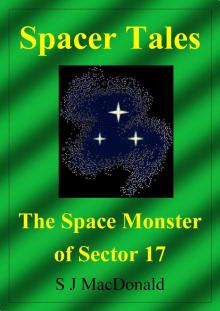 Spacer Tales: The Space Monster of Sector 17
Spacer Tales: The Space Monster of Sector 17 Spacer Tales: The Haunted Hatchway
Spacer Tales: The Haunted Hatchway Spacer Tales: The Lonely Engineer
Spacer Tales: The Lonely Engineer Spacer Tales: The Alien Monks
Spacer Tales: The Alien Monks Venturi
Venturi Spacer Tales: The Explorer
Spacer Tales: The Explorer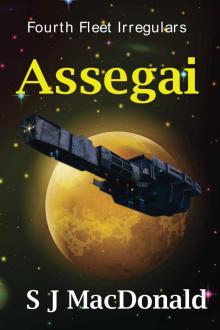 Assegai
Assegai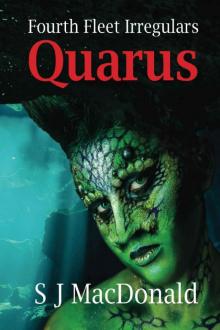 Quarus (Fourth Fleet Irregulars Book 6)
Quarus (Fourth Fleet Irregulars Book 6)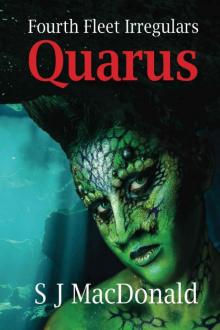 Quarus
Quarus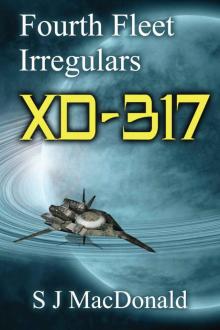 XD:317 (Fourth Fleet Irregulars)
XD:317 (Fourth Fleet Irregulars)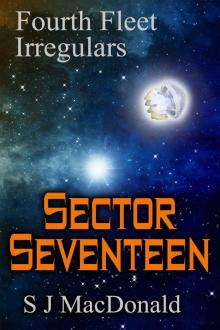 New Title 2
New Title 2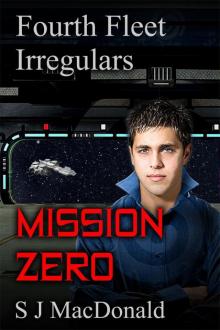 Mission Zero (Fourth Fleet Irregulars)
Mission Zero (Fourth Fleet Irregulars)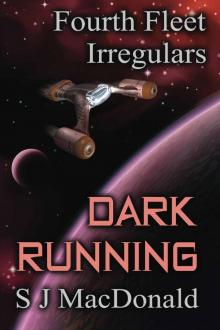 Dark Running (Fourth Fleet Irregulars Book 4)
Dark Running (Fourth Fleet Irregulars Book 4)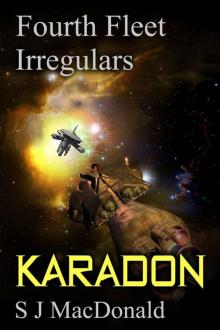 Karadon (Fourth Fleet Irregulars)
Karadon (Fourth Fleet Irregulars)